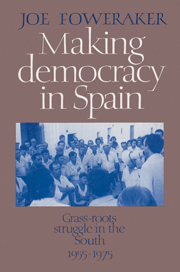Book contents
- Frontmatter
- Contents
- Preface
- Introduction: personal networks, political strategies and the making of democracy
- PART I PERSONAL NETWORKS, POLITICAL TRADITIONS AND STATE POLICIES
- PART II SYNDICAL PRACTICES, SOCIAL STRUGGLES AND POLITICAL PROTESTS
- PART III POLITICAL PRACTICES, REPRESSION AND STRATEGIC RESPONSES
- PART IV POLITICAL STRATEGIES AND THE DEMOCRATIC PROJECT
- 13 Democratic transformation and the transition to democracy: the political project of the labour movement, 1955–1985
- 14 Corporatist strategies and the transition to democracy: the institutional terrain of the struggle
- 15 Personal networks and political strategies: Spanish civil society in the struggle for democracy
- Bibliography
- Index
14 - Corporatist strategies and the transition to democracy: the institutional terrain of the struggle
Published online by Cambridge University Press: 29 September 2009
- Frontmatter
- Contents
- Preface
- Introduction: personal networks, political strategies and the making of democracy
- PART I PERSONAL NETWORKS, POLITICAL TRADITIONS AND STATE POLICIES
- PART II SYNDICAL PRACTICES, SOCIAL STRUGGLES AND POLITICAL PROTESTS
- PART III POLITICAL PRACTICES, REPRESSION AND STRATEGIC RESPONSES
- PART IV POLITICAL STRATEGIES AND THE DEMOCRATIC PROJECT
- 13 Democratic transformation and the transition to democracy: the political project of the labour movement, 1955–1985
- 14 Corporatist strategies and the transition to democracy: the institutional terrain of the struggle
- 15 Personal networks and political strategies: Spanish civil society in the struggle for democracy
- Bibliography
- Index
Summary
Political forces do not exist independently of the state: they are shaped in part through its forms of representation, its internal structure, and its forms of intervention.
Bob Jessop, The Capitalist StateCORPORATISM IN THEORY AND IN PRACTICE
At a time when political scientists have come to accept that there is no realistic possibility of a general theory of the capitalist State or, more especially, its historical forms, they are still reaching for general statements about contemporary corporatist structures and institutions. In their majority these statements are clearly descriptive rather than theoretical, and are derived from studies of the advanced industrial nations of Western Europe and North America; but this does not prevent them being applied, by induction, to other polities such as those of southern Europe. This procedure belongs to a broadly Weberian methodological paradigm, which sanctions the construction of a corporatist ideal-type to be used in the comparative investigation of different national realities where the various synthetic elements of the type will be found to be ‘more or less present and occasionally absent’ (Weber:1959). While such an approach may yield an interesting description, it runs the danger of subsuming different cases to the type in uncritical fashion, without trying to explain the differences.
- Type
- Chapter
- Information
- Making Democracy in SpainGrass-Roots Struggle in the South, 1955–1975, pp. 230 - 246Publisher: Cambridge University PressPrint publication year: 1989



